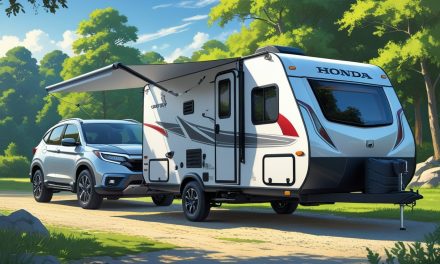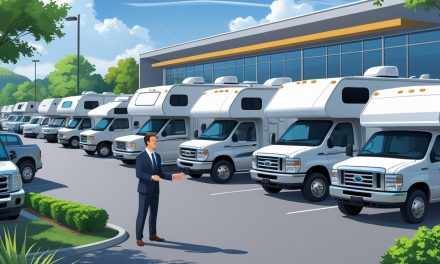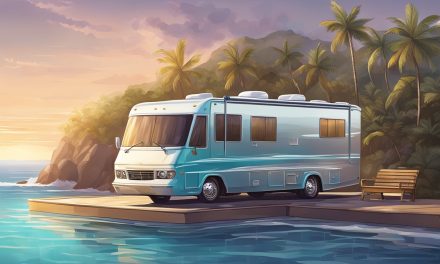Worried about the safety of your RV refrigerator? It’s a valid concern because fire risks and gas leaks can happen if they’re not cared for properly. This guide breaks down the dangers, maintenance tips, and how you can stay safe while camping.
Keep reading to protect yourself and your RV!
Key Takeaways
- RV refrigerators, especially propane models, pose fire risks due to leaks or igniting debris near burners. Regular maintenance reduces these dangers.
- Propane fridges use small flames for cooling but need proper ventilation to avoid dangerous gas buildup from hydrogen or ammonia leaks.
- Keeping the fridge level and turning it off while driving prevents damage and lowers fire risk during travel.
- Electric refrigerators cool faster and are safer than propane ones but rely heavily on power sources like batteries or inverters.
- Regular checks, cleaning vents, inspecting seals, and testing connections help prevent problems with RV refrigerators.
Fire Risks Associated with RV Refrigerators
RV refrigerators can catch fire for several reasons. Propane models have flames that can ignite debris, nests, or grease near the burner. Neglecting routine RV maintenance increases this risk.
Rusted absorber coils and corroded burner assemblies are common fire hazards. Check these parts before trips to avoid dangerous situations.
Leaks in propane, ammonia, or hydrogen gas also pose threats. Hydrogen is flammable and explosive but usually dissipates if vents work properly. Keep refrigerator vents clear to allow gas escape and reduce risks during your RV camping adventures.
Fireproof screens should be replaced after modifying vent access for cleaning tasks too!
Propane Refrigerators vs. Electric Refrigerators
Propane refrigerators can pose risks with leaks or fires, while electric ones rely more on your RV electrical system. Both have pros and cons, so it’s good to weigh the safety of each for your camping setup.
Higher fire risks with propane systems
Propane systems in RV refrigerators pose a higher risk of fire compared to electric models. A small flame powers the cooling system, and if not cleaned or maintained, debris like dust or nests can ignite.
This tiny spark can lead to an RV fire if near combustibles like propane tanks, stoves, or gas ranges. Faulty screw terminals and crimped connections might also cause problems with your appliances.
Leaks from liquid petroleum gas (LP gas), ammonia, or hydrogen add another layer of danger. Hydrogen leaks are rare but highly flammable when mixed with air. Proper ventilation reduces this risk but doesn’t eliminate it completely.
Keeping your fridge clean and inspecting its connections lowers these hazards significantly.
Potential for propane, ammonia, or hydrogen leaks
Leaks in propane, ammonia, or hydrogen can lead to serious problems. Propane is flammable and poses a fire risk if it escapes from the system. Ammonia leaks are dangerous due to their toxic fumes, which can harm your breathing.
Hydrogen gas is highly explosive but less risky because RV refrigerators use small amounts of it with proper ventilation.
Between the late 1990s and 2010, recalls addressed hydrogen leak dangers in gas absorption refrigerators. A small crack or faulty crimp connection may cause leaks over time. Regular rv maintenance helps catch these issues early.
Inspect for damaged pipes, seals, or loose wire connectors during your checks. Always keep an eye out for odd smells or unusual noises from your fridge while rving!
Challenges of Using Propane Refrigerators
Propane refrigerators can be tricky, like a finicky old car. They demand care, patience, and the right setup to work safely in your RV.
Need to keep the refrigerator level
RV refrigerators with propane systems must stay level. Parking on a slope or uneven ground can damage the cooling unit. The liquid inside may not flow properly, leading to coil crystallization.
This creates blockages and can cause your fridge to stop cooling.
Always check side-to-side leveling before setting up camp. Use leveling blocks or built-in jacks to fix uneven spots. An off-level absorption refrigerator running for too long risks costly repairs—or even complete failure of its cooling system! Keep things steady, avoid steep grades if possible, and maintain smooth operation in your recreational vehicle’s kitchen.
Slower cooling times
Propane refrigerators take their sweet time to cool. They need over 24 hours to fully chill. This can be a real hassle during short trips or quick stops. You might find yourself tossing spoiled food if the fridge can’t keep up.
Electric fridges cool much faster and are more reliable for fast-paced travel. While propane systems rely on heat absorption, electric ones use compressors, which work quicker. If speed matters in your RV adventures, this is something to think about before planning meals or storing perishables.
Higher energy consumption
Gas absorption refrigerators in RVs burn through a lot of energy. They use about 4-5 kWh overnight at 90°F, which is much higher than modern electric fridges. In fact, they can consume nearly eight times more energy compared to their electric counterparts.
Would you like to save this article?
If you’re running on propane gas, the system guzzles even more over time. This means refilling your tank often while camping or traveling. It’s not just inconvenient; it also adds to your expenses during trips in campers or motorhomes.
Safety Tips for Operating RV Refrigerators
Keep your RV fridge safe by learning smart habits—small steps can prevent big disasters.
Proper maintenance and inspections
Check your RV refrigerator at least once a year. Clean the burner using compressed air set between 90-100 PSI. This keeps it running safely and efficiently. Inspect LP-gas pressure with a manometer to confirm it’s at 11 inches of water column.
Incorrect pressure increases risks.
Make sure the drain tube routes condensation outside through side vents. Test your magnetic door gaskets often because replacements are pricey and hard to find. The thermistor, found on the fins, must stay properly placed to send accurate temperature readings to the control board.
Turning off the refrigerator while driving
Road vibrations can damage your RV refrigerator’s cooling unit. Turning it off while driving helps avoid this problem. Absorption-type refrigerators, which use propane or natural gas, also need to stay level for proper operation.
Driving on uneven roads could cause coolant blockages that lead to system failure.
Shutting the fridge off is also a fire prevention measure. Leaks from propane lines or ammonia in the cooling system might ignite while driving near hot engine parts or static electricity.
Planning ahead with ice packs or a cooler keeps food cold during short trips until you park and restart your RV appliances safely.
Are RV Refrigerators Worth the Risk?
RV refrigerators can be risky, but they serve a purpose. Propane models pose higher fire hazards due to leaks or combustion issues. Electric options may feel safer, yet they depend on power sources.
Propane fridges stay reliable during travel since they lack moving parts and use little electricity.
Switching to residential fridges with inverters or 12V DC models makes sense for RVers avoiding propane risks. These newer appliances perform well without the same dangers of ammonia or hydrogen gas leaks.
Regular rv maintenance like clearing vent debris helps avoid fires, keeping your recreational vehicles safer while camping.
Conclusion
Fires from RV refrigerators are rare, but they do happen. Poor upkeep or running on propane at a gas station can increase the risks. Keep your fridge clean, inspect it often, and check for recalls to stay safe.
Your camping style matters too; choose what fits you best—electric or propane. Safety starts with good habits!
FAQs
1. Are RV refrigerators a fire hazard?
Yes, they can be. Gas absorption refrigerators in RVs may cause fires if there are issues like poor maintenance, hydrogen gas leaks, or faulty connections in the RV electrical system. Regular repair and maintenance help reduce risks.
2. What causes an RV refrigerator to catch fire?
RV refrigerator fires often result from leaking hydrogen gas or problems with crimp connectors and wire nuts in the electrical system. Improper side-to-side leveling can also lead to overheating of components.
3. How can I prevent an RV refrigerator fire?
Perform regular RV maintenance, inspect crimping on wires with a proper crimp tool, check for liquid propane leaks near appliances, and keep your fridge cooling system clean. Fire suppression systems add extra safety during camping trips.
4. Is it safe to use other kitchen appliances alongside an RV refrigerator?
Yes, but you need caution when using items like air fryers or induction cooktops near flammable materials such as gas canisters or propane tanks stored inside travel trailers.
5. Do all types of refrigerators pose the same risk in an RV?
No, some models are safer than others. Gas absorption refrigerators have higher fire risks compared to electric-only options because they rely on heat sources like liquid propane for cooling.
6. Can improper leveling affect my fridge’s safety?
Absolutely! Poor sidewall leveling impacts engine cooling systems and increases stress on water heaters and furnaces too; this imbalance raises temperatures within your fridge’s components which could spark hazards over time while camping at remote spots without frequent checks!







